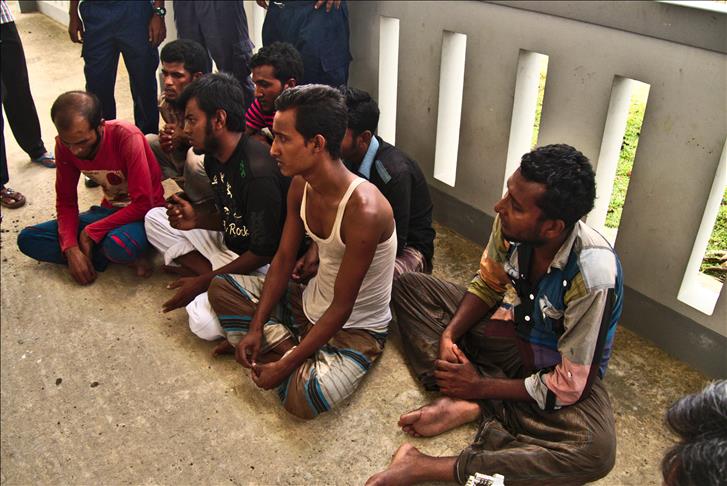Rescued migrants say many beaten, thrown overboard
Rescued from sea by fishermen, Bangladeshis say heavily armed traffickers tortured, abused them

COX'S BAZAR, Bangladesh
Apples, water and cigarettes - the first requests from seven Bangladeshi men recently rescued from the sea after jumping from a human trafficker's ship headed for Southeast Asia.
In a single-file of bowed heads, the men - some of them violently sobbing - were this week marched back through Bangladesh's docile docks at the coastguard base in Teknaf - a remote port town that sits on the edge of the river Naf, directly across from Myanmar.
The men had jumped off the crammed ship carrying them after seeing one of the traffickers, who they said were heavily armed, push the injured overboard.
"Twenty-eight days had passed and there were two or three people from Burma [Myanmar], they were sick, so the traffickers threw them into the water," Mahmoon Mullah, a 19-year-old shopkeeper from Jhinaidah in south-western Bangladesh, told Anadolu Agency.
Mullah said it was then that he and the others decided to risk swimming to safety after having been beaten regularly by the crew.
The men are just some of the thousands of impoverished Bangladeshis who have been attempting to travel by boat to Malaysia in the hope of economic salvation.
Since 2012, Rohingya Muslims - who the United Nations consider to be the world’s most persecuted ethnic minority - have also been fleeing Myanmar on the boats in droves, in fear of violence that some human rights groups consider to be state-sponsored.
The desperate passengers pay people smugglers around $3000 to take them to foreign shores, but it has been far from plain sailing. Outside of being beaten and abused, many of the passengers have been kidnapped and held in Thai smuggling camps while the smugglers have demanded ransoms from their relatives back home.
Since Thailand launched a crackdown on trafficking in its southern region May 1, boatloads of the migrants have been turning up on Thai, Indonesian and Malaysian shores, while many more remain at sea.
Another of the returnees, 37-year-old Mohammad Jashim, also from Jhinaidah, said the crew, delayed by the pushback against trafficked migrants in Thailand, Malaysia and Indonesia, had encouraged the jump.
"They said, there are problems in Thailand, there are problems in Malaysia, it could take a month, a day, a year,” said Jashim.
The crew, who he claimed were from Myanmar, would beat others simply for not understanding their language, he said.
"When they beat people, they got wounded and the wounds became infected, then they threw them into the sea," he said, adding that the passengers were so tightly squeezed on board that many had to sleep on each other’s laps.
Their sustenance, according to Mullah, was a few sips of water and plain rice with three chillies.
He said that the traffickers had singled out a Bengali woman. She was separated from the rest and from then on, they rarely saw and never spoke to her.
Both men claimed that they had been kidnapped; Mullah saying that a broker had tricked him by saying that he could visit two of his friends who he was to help travel to Malaysia, but had not yet departed.
But when he got to Cox's Bazar, he was taken.
They said "'if you don’t go, we will cut your throat and throw you into the sea'," said Mullah.
The seven men were found in Myanmar waters by local fishermen, who dropped them at a Myanmar village.
"They told us this is a Muslim village, go to any house and seek shelter," said Mullah.
The local Imam took them in and then later arranged for another group of fishermen, these ones Bangladeshi, to take them to the nearby Bangladeshi island of St. Martin's, where they were rescued.
According to Bangladesh's coastguard, there are at least four trawlers sitting in Myanmar waters; waiting for the focus on trafficking to blow away.
"We know there are some trawlers in Myanmar territory because in their own language, the smugglers have given their signal that 'we are not clear,'" Lieutenant Commander M Shahid Hossain Chowdhury, the Teknaf coastguard's station commander, told Anadolu Agency
Dickson Chowdhury, the St. Martin's Island commander who brought the men back to land, pointed to one of them as he explained that the trafficking was on pause.
"When he went to the port the first time, he could see 13 trawlers ready to go," said Chowdhury.
"This time, he saw only three."


